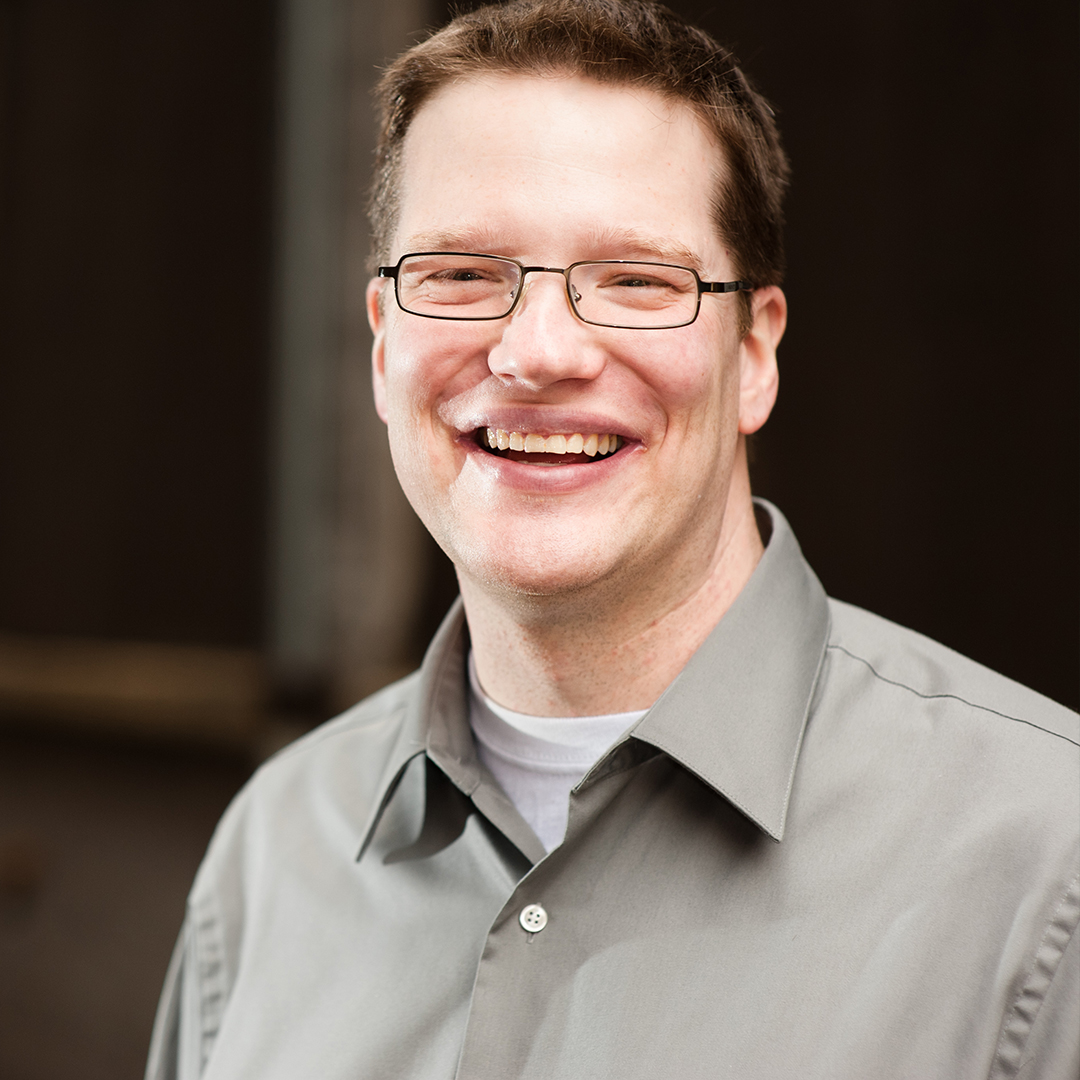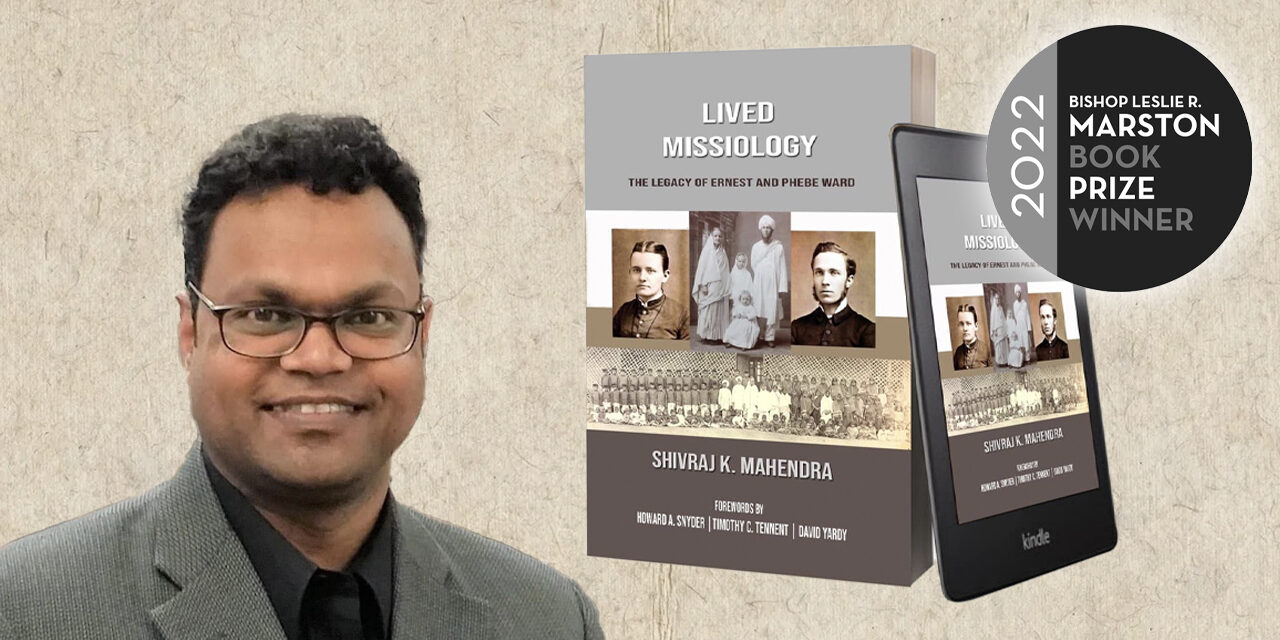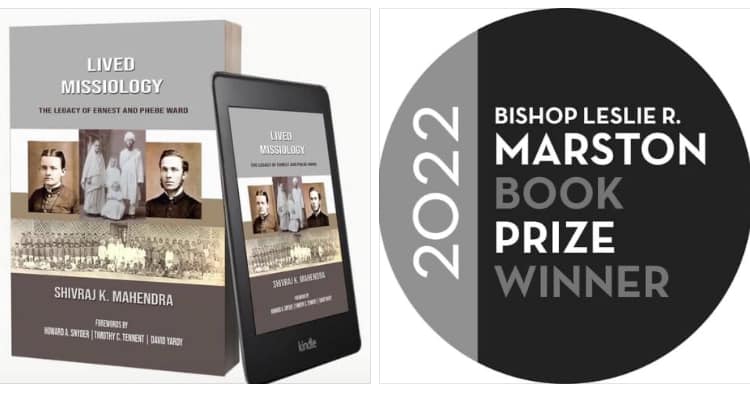
Jeff Finley
Jeff Finley is this magazine’s executive editor. He joined the Light+Life team in 2011 after a dozen years of reporting and editing for Sun-Times Media. He is a member of John Wesley Free Methodist Church where his wife, Jen, serves as the lead pastor.
By Jeff Finley
A box of papers in Kentucky led a sociologist and theologian to uncover surprising information about pioneer missionaries to his home country of India. The discovery eventually led Shivraj K. Mahendra, Ph.D., to refocus his research and to write a book that recently received the Bishop Leslie R. Marston Book Prize.
The Marston Memorial Historical Center and the Committee on Free Methodist History and Archives judged Mahendra’s book, “Lived Missiology: The Legacy of Ernest and Phebe Ward,” to be “the most significant publication over the preceding 12 to 24 months in terms of the contribution it makes to understand Free Methodist origins, history, and mission.”
Although Mahendra lives in India, he didn’t hear about Ernest and Phebe Ward until his time in the United States as a doctoral student at Asbury Theological Seminary in Wilmore, Kentucky.
“I was working on my dissertation, which was on a different topic initially,” Mahendra said on a new episode of “The Light + Life Podcast” during an interview with Brett Heintzman. “I was working in the publications department, and my boss, Robbie Danielson, happened to show me a box of material and say, ‘You might be interested in this missionary work in India.’”
Mahendra initially didn’t think the box contained enough material to be useful.
_
“I just flipped through one of the diaries and realized that this guy had actually come to my place in central India.” – Shivraj K. Mahendra
_m `
“It was a small box, and I wasn’t sure if that had enough material for my Ph.D.,” he recalled. “I just flipped through one of the diaries and realized that this guy had actually come to my place in central India. So that was the connection that brought me to Ernest and Phebe Ward, and they were the pioneering Free Methodist missionaries to India.”
Mahendra has been a Christian for 26 years.
“The Lord Jesus Christ appeared to me in 1996, and that was in my village in Chhattisgarh, central India, Mahendra said. “I was in high school.”
He was surprised to read that Ernest Ward ministered in the same Indian village 100 years earlier.
“It was in 1896 that Ernest Ward had walked to my village,” Mahendra said. “What Ernest had tried in 1896 was to go and start the mission so that he could reach out us, the fishermen in central India. My last name is Mahendra, and Mahendra means fisherman. He actually worked among the fishermen and enjoyed their fish.”
Mahendra became fascinated as he read more.
“There was another thing that caught my attention, and that was that he had chicken curry with the local raja, the king. I said, ‘Oh, I need to read more about this person,’” Mahendra recalled. “The material that was at Asbury was like a tip of the iceberg, and then from that point, I got deeper into it. I found that Ernest and Phebe are basically unknown.”
He asked Free Methodist pastors if they knew about the Wards, and they replied that they weren’t familiar with them.
_
“There was so much about their work that has never been remembered, never been discussed…” – Shivraj K. Mahendra
_m `
“That kind of inspired me, and I felt the divine inspiration and a grateful obligation also to tell their story to the people,” he said. “There was so much about their work that has never been remembered, never been discussed. … Here is an uncelebrated missionary couple with an extraordinary story, and I must tell it.”
A colleague introduced Mahendra to the Marston Memorial Historical Center & Free Methodist Archive in Indianapolis. She accessed material for him, and then he later spent a week studying at the center and staying in the home of retired Free Methodist missionaries David and Sherrill Yardy.
“Initially, I was doubting I could do a Ph.D. dissertation,” Mahendra said. “That idea was transformed now that we had more than I was expecting. From the Marston Memorial Historical Center & Archives, I got nearly 20 boxes of diaries and letters. Then further I found reference to other materials that were available at the University of Virginia in Charlottesville. … Then also I found out that the British Library in the United Kingdom had a book by Ernest Ward, so I contacted them, and they were kind enough to send me that material.”
From Illinois to India
Mahendra said Ernest Ward worked in a county clerk’s office. During the 1870s, Ernest “was seeking after Christian holiness” and “was a little bit disappointed” that he couldn’t find what he wanted within the Methodist Episcopal Church (the forerunner of today’s United Methodist Church).
“He wanted to explore deeper, and then he came to know about the Free Methodist camp meetings that were taking place,” said Mahendra, who noted that Ernest found the Christian holiness he desired along with a companion in life and ministry. “In one of those camp meetings, he also met Phebe.”
Phebe grew up in a farming family. She raised some of her own crops on the family farm and donated the proceeds to ministry efforts in Chicago and other places.
Along with encountering holiness and finding love at the camp meeting, “that’s where their desire to become missionaries to India was kindled,” Mahendra said. “They were an ordinary couple who has come out from Illinois, America, and transformed central India with what they became and how the Lord used them. It’s an amazing story of these ordinary people becoming extraordinary missionaries.”
Ernest introduced Phebe to the writings of Albert Norton, a missionary to India who advocated for others to go to the Asian nation.
“When they met together in trying to come together as a couple, they thought they could just go as missionaries and take God’s Word to India, so there was an inspiration through the information that had come, and they were just people looking for an opportunity to make an impact,” Mahendra said. “This is much before the Free Methodist Church had formed its Foreign Mission Board, so they were kind of on their own.”
_
“They trusted the Lord. They did not have any regular support, no promise guaranteed…” – Shivraj K. Mahendra
_m `
He said the board formed in 1885, but the Wards were “faith missionaries” who left the United States for India in 1880.
“They trusted the Lord. They did not have any regular support, no promise guaranteed, and that lays a strong foundation for faith missions even today,” Mahendra said. “When we talk to our pastors and say that ‘we cannot pay you, but the Lord will provide for you,’ it’s like the Ernest and Phebe Ward model of mission.”
Some church members in the United States may know of the Wards because of Free Methodist World Missions’ Ernest and Phebe Ward Society, which helps provide retirement benefits for earlier missionaries who served without option of pension.
An Influential Convert
Although the Wards’ name is no longer well-known in India, Indian Christians are familiar with the prolific work of poet and hymn writer Narayan Vaman Tilak who died in 1919.
“His legacy is the songs. The people who tell his story and the scholars who talk about him, they don’t know who was the missionary who gave the gospel to him,” Mahendra said. “I discovered it was Ernest Ward who was preaching on a train and singing on a train. … They met on a train ride, and [Ernest] shared the gospel with him, and then he believed in Jesus.”
The Wards were the founders of the interdenominational India Holiness Association in 1910. Their work also helped to spark a revival in central India.
“It was all Ernest Ward’s and Phebe Ward’s orphan kids whom they had kind of reared, and they had come to these meetings, and they were part of the whole revival,” Mahendra said. “This is one of those great legacies I want to highlight.”
They also influenced education and health care.
“What we have today as the Union Biblical Seminary and Umri Christian Hospital, they all have their roots in the mission works of Ernest and Phebe Ward,” said Mahendra, a Union alumnus.
Holy and Holistic
As the Wards engaged in humanitarian work, they never lost their focus on holiness — unlike many other Christians who have engaged in church planting and missions work.
“The emphasis on Christian holiness was at the top of Ernest and Phebe’s commitment as missionaries,” Mahendra said. “Whether it was orphan work, whether it was village outreach or tribal outreach, anything they did, the message always remained Christian holiness.”
_
“They didn’t stop dialoguing with people of other faiths” – Shivraj K. Mahendra
_m
While not compromising this holiness emphasis or their Christian beliefs, he added, “they didn’t stop dialoguing with people of other faiths. … They were working among the Muslims, the tribals, the Hindus … you name it, and all those things are described in detail in my book.”
While some modern Christians divide over whether to share the gospel or to improve social conditions, the Wards did both.
“Evangelism and social work went hand in hand in the ministry of Ernest and Phebe Ward,” Mahendra said. “Sometimes people try to separate it, and somebody just wants to preach, or somebody just wants to do charity. This couple amazingly combined them together. … That’s something of a unique model that I would call the holistic mission. Holistic mission is what we should do.”
Unlike missionaries who focus on a specific group of people, the Wards ministered to both common people and royalty.
“They were reaching out to children. They were reaching out to religious people. They were talking to the kings,” Mahendra said. “That is the kind of relationship I would like to build as an evangelist, as a witness of Christ — serving the needy and at the same time witnessing to the royals, and that is something very exciting in the life of Ernest and Phebe for me.”

Jeff Finley
Jeff Finley is this magazine’s executive editor. He joined the Light+Life team in 2011 after a dozen years of reporting and editing for Sun-Times Media. He is a member of John Wesley Free Methodist Church where his wife, Jen, serves as the lead pastor.










